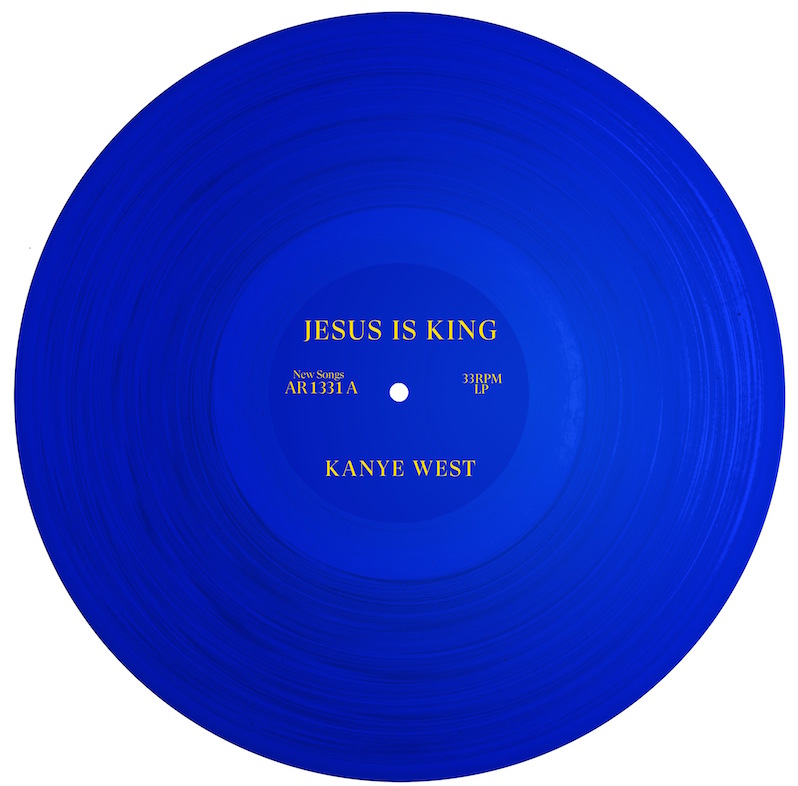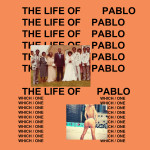Kanye West : Jesus Is King

Americans are obsessed with work. We believe the extent to which we exert effort into our jobs is the extent to which we deserve to live. Obituaries give our name and then our jobs, pulling rank over even the loved ones we leave behind and who were by our side as we slipped away into that gentle ether. “So, what do you do?” is one of the first things we ask when we meet people in dating rituals and size them up for carnal relations. From the time kids are somewhat sentient, they are shuffled around and coached in pursuing a vocation, given a smattering of standardized tests, and shamed for taking any college course that isn’t a direct pipeline into the workforce. We happily accept unpaid internships where we bow our heads and eschew a salary in allegiance to a suit who will pay us in the mystical currency of “experience.” The more demeaning the hazing rituals are, the more virtuous, as we perceive that the pressurized anxiety we invest will yield a glistening quality of life to be extracted from the ordeal. Our obsession with work flirts with idolatry. However, when we are in the midst of the chaos of this nonstop onslaught of paying our dues and ignoring our friends, family, hobbies and health, we miss a vital fact: work is amoral.
Work is not virtuous. Even if you “love your job,” in the grand scheme of activities in which we partake, the apex of a great job still tops out at about a C+. It’s akin to the best airplane food in the world. Work impedes us from pursuing hobbies, mastering meaningful pursuits, and finding enlightenment. Work is not sacred; it’s a leash that keeps us bound to a callous parasite who leeches our time and energy under the false premise that we can parlay our labor for purpose. But this purpose is snake oil. For the past two years I have read about professors who have walked away from classrooms after realizing that bulbous administrations have pimped academia into a bloated and exploitative debt-racket; I have read about Andrew Luck who, after pissing blood, decided to walk away from the brutality of Football; I watched Mitski give herself space from making music, indefinitely stating “…I sense that if I don’t step away soon, my self-worth/identity will start depending too much on staying in the game.” She’s entirely correct. Our sense of validation to this universe has become totally ensnared with our jobs. In each case, listening to people abandon these shackles has been a cathartic rejection of this snake oil.
This fulmination of work also includes Kanye West’s job. To be sure, Yeezy’s is one of the best jobs you can have: it’s lucrative, creative, meaningful and surely there are times when he feels appreciated by his overlords. But there it is; even the greatest jobs in the world have conniving gatekeepers breathing down our necks and skimming the supple peel off of the fruits of our labor. Kanye’s job sucks too and judging by his output and behavior over the past three years, it is not a stretch to say that Kanye West wants to quit his job.
To be sure, Kanye’s labor has brought me lots of happiness. The selfish part of my mind wants Kanye to stay at his job and return to being a loyal employee but the ethical part of my brain knows Kanye wants to quit and we should give him that right. It isn’t clear if it’s because he simply cannot bring himself to quit a job that pays so well or because (more realistically) he is contractually obligated to not quit his job but, Kanye has been showing signs of wanting to call it a career for a while now. Yeezus may not have been West’s most beloved effort but it was at least admirable that he was willing to create an album that potentially nobody liked in order to do something new. The Life of Pablo had some gems (“Ultralight Beam, “Wolves”, etc.) but this is where Kanye began to show disillusion with the entire concept of recording static artifacts, as evidenced by having released, retracted and altered the album multiple times.
Even if the album wasn’t perfect, at the very least the ephemeral process of the record’s creation lent itself to Kanye’s creative mystique. However, it was on ye where he truly showcased what he desperately wanted to be his two-week notice. Simply, ye was simply boring and aimless. To boot, it came out on the heels of endorsing Trump and making bombastic claims about the exigency of slaves. It felt like an essay that was created with apathetic desperation the night before the due date: poor grammar, sloppy support of claims, and no focus. But, like every other naive Kanye fan, I listened with hopes that his erratic behavior was a stressed-out hiccup, as if the cacophonous sound in my car engine and the cascade of warning lights on the dash were nothing to fret. However, the support for white-supremicist oligarchs continued, as did the defense for some of history’s most heinous acts. This is calling it a career by 10,000 cuts. The only reason Kanye has not been able to escape his job is that, unlike most regular jobs where his shoddy performance would yield walking papers with haste, Kanye is an entertainer, where vice, surly outbursts and debauchery add to the ethos, like Keith Richards’s weathered wrinkles or Willie Nelson’s pot charges. Kanye is stuck in an aquarium where we equivocate his bad behavior as a byproduct of brilliance.
Enter Jesus is King. There are no more hot takes, really, other than the dichotomizing theories that he’s both trying to court conservative audiences and trying to atone for courting conservative audiences. But, frankly, the serpent’s Apple is too far down our collective throats to be so naive as to ask if Kanye is “back.” And yet, if you’re in your mid-30s those halcyon days of red shutter shades, auto-tuned melancholy and auteur-obsessive Hawaiian recording sessions occupy a still-glowing crater in our sentimental memory and so we always come back. The lure of nostalgia is a syrupy opiate that drowns out ignorant political opinions and mindless reality TV. Without snark or elitist accusations that Christian contemporary is dorky, the album is listenable.
Kanye’s sparring with soul-samples on “Follow God” is a glimmer of Kanye’s whimsical golden-era production and “Water” has a archetypically uplifting gospel chorus but selections like “Closed on Sunday” with its laughable chorus of “Closed on Sunday/you my Chick Fil A/Hold the selfies/put the ‘gram away” come off as amateurish sap. “Use This Gospel” suggests that Kanye is so bent on shedding his youthful ethos, he has reunited Clipse, once masters of witty cocaine/snow metaphors, to perform selfless Christian praise, and wedged in a Kenny G sax solo. If Kanye still seemed interested in creating dynamic soundscapes and using his platform to take awkward jabs at Presidents who express apathy towards marginalized populations, there would be more to critique. If Kanye really wanted Jesus is King to be a hardcharger into the genre of “Hip-Hop for adults,” alongside albums like 4:44, it would make sense to critique the vapid circular logic of the album, which seems to argue nothing more than that you should be Christian because you should be Christian, as opposed to harnessing a possible liberatory religious tradition. But, I don’t think Kanye is interested in those things. Kanye simply wants to quit and we should let him.
It’s simply not reasonable to expect anyone to stay the same or to anachronistically yank their entire existence back in time, so we can be reminded of a bygone context that nostalgia has painted, as necessarily better than now. In addition to fetishing hard work, Americans also hold a bizarre affection for longevity. That is, the more we slog away in our laborious onslaughts, the more we have proven our value. But why is this? Why do we frown upon someone who jumps from job to job? Is there really any virtue in clenching our teeth and enduring something that fills us with no joy for long periods of time? While working, Kanye has given us four (arguably five) of the greatest pieces of American art, of all time. Is he obligated to keep at it? Getting older is difficult and we all defend ourselves against the fisticuffs of time in different ways. We grow desperate to connect ourselves with something much larger. We crave something more meaningful and grandiose than ourselves and being that our requisite jobs likely allow no such thing, some of us buy sports cars and some of us take up birdwatching. Kanye has found God.
Jesus is King is not so much good as it is significant. Don’t listen to this record thinking this is nostalgia’s time-defying spaceship returning to Earth to bring you back to 2007. To appreciate Jesus is King, you need to sew Kanye’s misanthropic disillusion very tightly to the music. This is not the next phase of Kanye’s brilliance; this is devil-may-care exile from a job that can no longer maintain an illusion of nobility.
Kanye is shunning work for enlightenment. He has a new hobby Sunday mornings, his family and, hopefully, the catharsis of unemployment. And while becoming a devout born-again Christian may not be the sexiest or hippest pastime, Kanye has perhaps become enlightened to the feudalism of work. It’s reductive to simply review Jesus is King in isolation, as it’s just one strand of a massive web. West’s lively Sunday services have a huge buzz going and while an invite-only admission policy for a religious event is ostensibly offensive, it’s likely less elitist star-fuckery and more commitment to quitting his job as the “Old Kanye”. He probably doesn’t want sycophants (like me) hounding him to perform “Spaceship” and “Good Life.”
Similar Albums:
 Kanye West – The Life of Pablo
Kanye West – The Life of Pablo
 Chance the Rapper – Coloring Book
Chance the Rapper – Coloring Book
 Lil Wayne – Tha Carter V
Lil Wayne – Tha Carter V
If a meteor was just hours away, Paul Glanting would recall that he has been in a Lil Wayne music video and has a 4.7 (out of 5) on Rate My Professor. He is at work on his first novel, Adjunct Megafauna.

